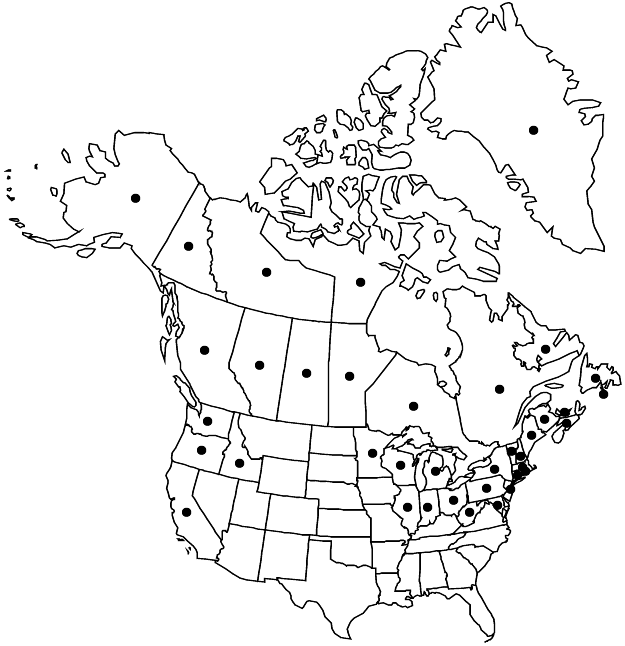Vaccinium oxycoccos
Sp. Pl. 1: 351. 1753 ,.
Plants trailing, shoots 0.1–0.3(–0.5) dm. Leaf blades glaucous abaxially, green adaxially, ovate, sometimes elliptic, 3–10 × 1–5 mm, coriaceous, margins entire, strongly revolute. Inflorescences in axils of leaflike bracts at base of previous year’s or older shoots, (leafy portion often failing to elongate). Pedicels nodding, slender, 2–3 cm, bracteolate or not; bracteoles 1–5, reddish, scalelike, to 1 mm wide. Flowers: calyx lobes relatively small; corolla strongly reflexed at anthesis, white to deep pink; filaments hairy; anther tubules 2–2.5 mm. Berries deep red, red-spotted at first, 6–12 mm diam., smooth. 2n = 24, 48, 72.
Phenology: Flowering early summer.
Habitat: Half buried in Sphagnum hummocks in bogs, fens, muskeg, arctic-alpine tundra
Elevation: 0-1500 m
Distribution

Greenland, St. Pierre and Miquelon, Alta., B.C., Man., N.B., Nfld. and Labr., N.W.T., N.S., Nunavut, Ont., P.E.I., Que., Sask., Yukon, Alaska, Calif., Conn., Idaho, Ill., Ind., Maine, Md., Mass., Mich., Minn., N.H., N.J., N.Y., Ohio, Oreg., Pa., R.I., Vt., Wash., W.Va., Wis., n Europe, n Asia.
Discussion
Vaccinium oxycoccos is interruptedly circumboreal (absent from the Canadian Arctic Archipelago, including Baffin Island) extending southward in North America to California in the Cascade Range and to West Virginia in the Appalachian Mountains.
In Europe, some chromosome races of Vaccinium oxycoccos have been given specific rank (S. P. Vander Kloet 1983) at one time or another; unfortunately, hexaploids cannot be differentiated consistently from diploids or tetraploids using morphological features such as leaf indumentum or bract size.
On most vines, especially north of 50° north latitude, the leafy portion of the fertile shoot fails to develop, giving the illusion that Vaccinium oxycoccos has an inflorescence comprising a short rachis bearing flowers on a slender pedicel.